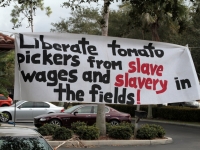Florida Tomato Pickers Sign Up New Major Retail Chains For Higher Wages

The Fresh Market, a major U.S. retail chain, recently joined the Coalition of Immokalee Workers' (CIW) Fair Food Program, adding another victory in the battle for humane working conditions for tomato pickers in Florida's $650 million industry. Thirteen companies including Burger King, McDonald's and Walmart have signed up so far.
CIW is a worker-based human rights organization that was started by a small group of workers in 1993 in Immokalee; an impoverished town in Florida, that lies 30 miles east of the tomato fields. The town rose to national prominence when farmworkers mobilized community-wide stoppages and boycotts of major fast-food companies to stop declining wages, forced labor, sexual harassment and other abusive practices in the industry.
"When I first visited Immokalee, I heard appalling stories of abuse and modern slavery," Susan Marquis, dean of the Pardee RAND Graduate School, told the New York Times. "But now the tomato fields in Immokalee are probably the best working environment in American agriculture. In the past three years, they've gone from being the worst to the best."
More than 100,000 workers work most of the year in the tomato fields earning an average of $7.25 per hour, the minimum wage allowable in the U.S. (In July 2014, a group of 100 economists organized by the Political Economy Research Institute at the University of Massachusetts at Amherst signed a petition to raise the minimum wage to $10.50. "If a worker today is employed full time for a full 52-week year at a minimum wage job today, she or he is making $15,080. This is 19 percent below the official poverty line for a family of three," the group wrote in their letter.)
Activists say that the tomato pickers were routinely denied mandatory breaks, were often forced them to work 10-12 hours without overtime and even "off the clock" ie without wages. Workers were also refused the right to organize under a union.
The U.S. Department of Agriculture (USDA) "Profile of Hired Farmworkers" states that farmworkers remain among the "most economically disadvantaged working groups in the U.S." The profile cites the acute and structural dangers facing farmworkers including: strenuous physical labor, pesticide exposure, inadequate sanitary facilities and substandard housing. The tomato fields, the USDA confirmed, were also a breeding ground for involuntary servitude and sexual harassment.
Twelve years after the first protests began, Yum Brands (which owns KFC, Pizza Hut and Taco Bell), signed a landmark agreement in 2005 with CIW to pay an extra penny a pound of tomatoes in order to improve wages for the tomato pickers. This was followed by a CIW agreement with McDonalds in 2007 and Burger King in 2008.
In 2011, CIW launched the Fair Food Program as a partnership between farmworkers, Florida tomato growers and participating retail buyers. Participating buyers are required to commit to buying Florida tomatoes only from growers in good standing with the Fair Food Program and cease purchases from any growers who have failed to comply with the code of conduct.
Today CIW estimates that the extra penny has provided $15 million in extra wages directly to the workers - an extra $60-80 per worker per week - since 2011.
"The Florida agricultural industry has been mired with a history of grave human rights abuses and farmworker exploitation since its inception," said Oscar Otzoy, a CIW member, told Global Research in Canada. "We created the CIW not to address individuals on a case-by-case basis, but to completely transform the agricultural industry as a whole."
Farmworkers act as real-time monitors in the fields to identify and expose human rights violations. The Fair Foods Standard Council - a third-party monitoring system - resolves workers' complaints, audit farms for compliance and enforces the Fair Food Program standards. So far, only a few growers have been placed on probation and one suspended for failure to pass remedial audits.
The Fair Food Program also organizes worker-to-worker sessions training with the Know Your Rights and Responsibilities booklet, a 24-hour complaint hotline, a health and safety committee with workers' representatives on every farm to check up working conditions like mandated rest breaks, provision of drinking water and zero tolerance for forced labor and sexual harassment.
"I'll be able to be a voice for the other workers...For me the most important thing is respect. Now it feels calmer and better at work," two anonymous members of the CIW told the National Farm Worker Ministry.
The Fresh Market has vowed to increase its purchases by 15 percent each year from Florida tomato growers participating in the program as well as make a yearly contribution to support the Fair Food Standards Council.
"We continuously look for ways to source the best products, and being a part of the FFP helps us to know we are sourcing from growers whose practices are fair and socially responsible," Lee Arthur, Fresh Market's merchandising vice president, said in a press release.
"This is the best workplace-monitoring program I've seen in the US," said Janice Fine, labor relations professor at Rutgers. " It can certainly be a model for agriculture across the US. If anybody is going to lead the way and teach people how it's done, it's them."
- 184 Labor



